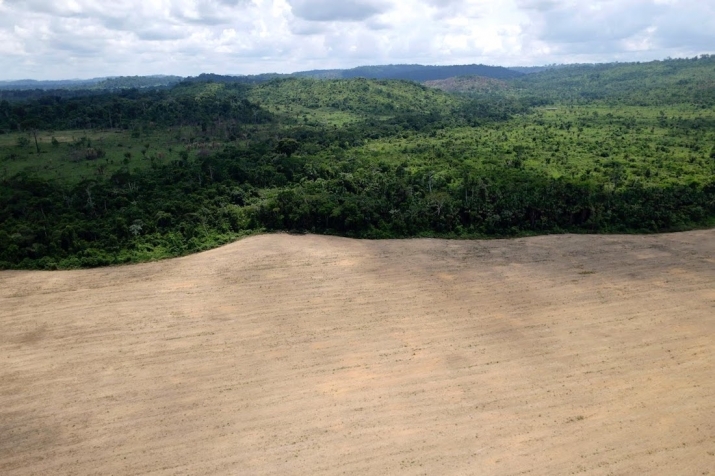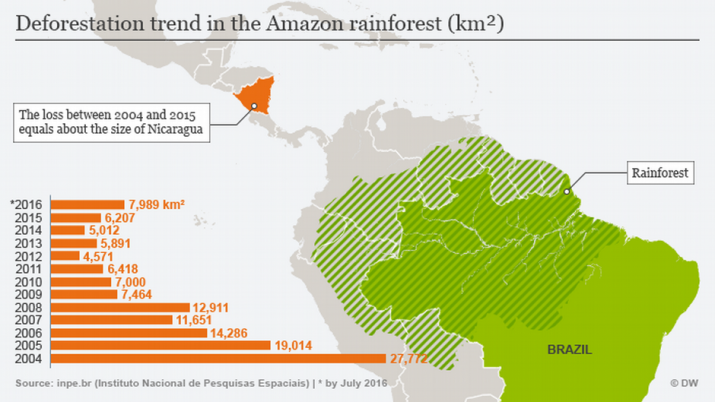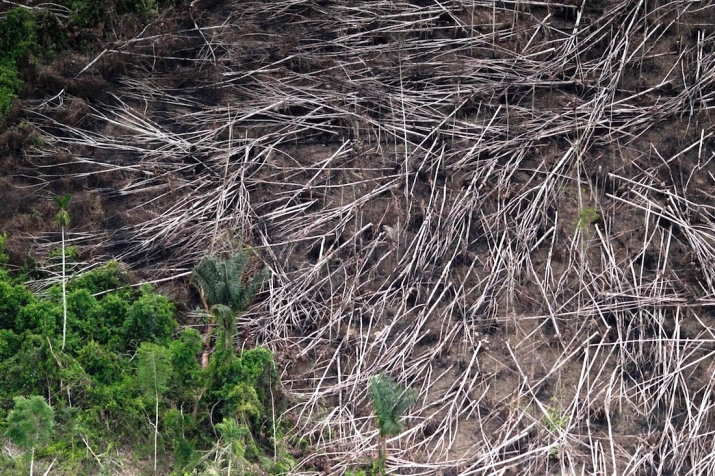NEWS
Amazon Rainforest Loss at Highest Level Since 2008, Says Brazil
 A tract of Amazon rainforest cleared by loggers. From reuters.com
A tract of Amazon rainforest cleared by loggers. From reuters.comThe rate of deforestation in the Amazon has risen for a fourth consecutive year, according to a new study published by the Brazilian government, which estimated an alarming 29 per cent increase from last year. According to data released by Brazil's National Institute for Space Research (INPE), which is based on satellite imagery, the country’s rainforest was depleted by an estimated 7,989 square kilometers between August 2015 and July 2016, compared with a loss of 6,207 square kilometers a year earlier.
The Amazon is home to the world’s largest tropical rainforest, spanning Bolivia, Brazil, Colombia, Ecuador, French Guiana, Guyana, Peru, Suriname, and Venezuela. Covering about 5.5 million square kilometers, it is bigger than the next two largest—the Congo Basin and Indonesian rainforests—combined, and is home to a vastly rich ecosystem that includes some 40,000 plant species, 1,300 bird species, 3,000 types of fish, 430 mammals, and 2.5 million insect species. Around 500 indigenous Amerindian tribes are believed to live within the Amazon rainforest, of which as many as 50 may never have had contact with the outside world.
“This is a big deal,” said Daniel Nepstad, a senior scientist at the Earth Innovation Institute, a US-based non-profit research organization. “It is the highest deforestation number since 2008. Compared to the lowest deforestation number, in 2012, it means an extra 150 million tonnes of CO2 went up into the air through forest destruction.” (The Washington Post)
 From dw.com
From dw.comRainforests are sometimes dubbed the “lungs of the Earth” because their rich vegetation filters carbon dioxide from the atmosphere while releasing oxygen—the Amazon alone, nearly twice the size of India, supplies more than 20 per cent of the world’s oxygen and absorbs an estimated 2 billion tonnes of carbon dioxide a year. The depletion of these tropical forests is therefore a crucial factor in global warming, accounting for 8–15 per cent of total global emissions.
While Brazil's data is worrying, the deforestation figures remain far below levels recorded in 2004, when 23,103—24,398 square kilometers of forest was razed. At the time, Brazil proceeded to introduce new enforcement methods that, combined with satellite imaging, the establishment of protected areas, and the introduction of fines for illegal logging, were able to significantly slow deforestation. The reasons behind the most recent increases are not fully understood, but many experts point to weaker enforcement by Brazil’s government, which is facing difficulties on both the political and economic fronts.
“It seems that we are facing a new trend of deforestation. It has increased [for] two years [and] it’s now close to 8,000 square kilometers. We left behind the level of 5,000 square kilometers, which was stable for three years,” observed André Guimarães, executive director of Brazil’s Amazon Environmental Research Institute (IPAM). “Suppression of Amazon deforestation is still highly dependent upon command-and-control measures—namely, law enforcement. The cost to the government—to Brazilian taxpayers—of catching and penalizing people who are clearing forests illegally is huge and Brazil’s economic crisis has cut into the budgets of the federal environmental enforcement agency (IBAMA) and the state level enforcement agencies.” (The Washington Post)
 Deforestation in Brazil has risen for a fourth consecutive year. From reuters.com
Deforestation in Brazil has risen for a fourth consecutive year. From reuters.comIn addition, Brazil yielded to pressure from agricultural and industrial lobbies in 2010, revising its forest code. The conversion of forestland to agricultural uses has helped make Brazil the world's largest exporter of beef and soy. “In addition to a weakened enforcement effort, beef prices have increased, making it more lucrative to convert forests into cattle pastures,” noted Nepstad. (The Washington Post)
In line with its pledge under last year’s Paris climate agreement, Brazil drew up a strategy to halt all illegal deforestation in the Amazon and to restore 120,000 square kilometers of forests by 2030. The country’s government clearly needs to adjust its present course if it intends to honor that commitment.
See more
Amazon deforestation ticks tragically up (Deutsche Welle)
Destruction of the Amazon is speeding up — just when the planet can least afford it (The Washington Post)
Brazil’s Amazon Guardians (Reuters)
Deforestation Of The Amazon Up 29 Percent From Last Year, Study Finds (the two-way)
Related news from Buddhistdoor Global
Arctic Melt Occurring at an Unprecedented Rate, Experts Warn
Gyalwang Drukpa Warns of Climate Change Threat to Himalayan Water Sources
One Earth Sangha Issues Buddhist Statement of Support for Standing Rock Protestors
World’s Largest Marine Wildlife Sanctuary Created in Antarctica
Buddhist Monks Working to Tackle Deforestation in Cambodia
|Taiwan Temples Forsake Tradition for Environmental Responsibility
Vatican Extends a Call to Arms to Buddhists on Vesak Day to Address Eco-crisis
Dalai Lama Lends Weight to Interfaith Climate Change Statement
Bhutan Plants 108,000 Trees to Celebrate Birth of Crown Prince
Cambodian Monk Launches International Appeal to Save Country’s Forests
Reforestation: Creating a Greener World
The Buddhist Monk Who Helped Broker a Global Climate Deal
Buddhist Climate Change Statement Delivered to President Hollande
Top Buddhists Sign Landmark Statement on Climate Change to Global Leaders
Related features from Buddhistdoor Global
Buddhistdoor View: The Dharma’s Place in the Global Climate Change Crisis
Buddhistdoor View: How the Zeitgeist of Greed and Materialism is Destroying our Ecology and the World
Eco-wisdom and Effort
Time to Stand Up: An Engaged Buddhist Manifesto for our Earth – The Buddha’s Life and Message through Feminine Eyes – Book Review
Conscientious Compassion—Bhikkhu Bodhi on Climate Change, Social Justice, and Saving the World














